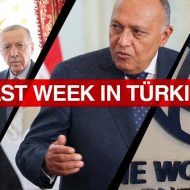What began as isolated protests against a standard criminal-extradition law has somehow erupted into a violent fury throughout Hong Kong. The Chinese city’s American-and-British-flag-waving protesters are, on the one hand, calling for “freedom, human rights, and democracy” while, on the other, assaulting police and even random bystanders alike.
Western media have already been on the offensive against Beijing’s claims that Washington has its hand in the chaos, with mockingly titled articles like the New York Times’ China’s Theory For Hong Kong Protests: Secret American Meddling. Others like The Washington Post’s China Leaks U.S. Diplomat’s Information In Message Aimed At Hong Kong, Not Washingtoncite only anti-communist “experts” in analyzing how the Chinese government has responded.
For Beijing, it’s a case of deja vu – one with “the obvious characteristics of a color revolution” said the Director of Hong Kong and Macau Affairs Office, referencing US-backed revolts that have destabilized countries around the world since the end of the Cold War.
And based on both the history of Hong Kong, as well as the facts that have surfaced thus far regarding Washington’s relationship with the longstanding leaders of insurrection in the city, these protests not only amount to a welcome mat for Western imperialism – but a flashpoint of class struggle in the People’s Republic of China (PRC).
Colonialism: A Bloodstain On Chinese History
Any analysis of Hong Kong’s current historical conditions must begin with the First Opium War between Imperial Britain and Feudal China.
The war broke out as a result of the British Empire’s illegal smuggling of opium into China, intended to tip bilateral trade in London’s favor and sedate the population in preparation for Western colonization. Marking China’s defeat in 1842, the Treaty of Nanking also handed over Hong Kong to British colonial rule.
Until 1997, when the UK returned Hong Kong to the People’s Republic of China, the city developed into a headquarters of British finance capital and a constant reminder of the bloody stain Western imperialism has left on the country’s history.
However, the Sino-British Joint Declaration that returned Britain’s colony to China included several important stipulations. The most significant was Hong Kong’s drafting of a constitution that would assure the city’s retention of its capitalist system, leading Beijing to adopt the “One Country, Two Systems” policy of governance.
What results has this policy yielded?
Those with ties to British Capital never really left the enclave and Hong Kong’s sovereignty status changed little more than in name only. Although the city now has its own currency (pegged to the U.S. dollar), passports, and legal system, the ruling capitalist class there is far more invested in the former colonial power with which it collaborated and the U.S., than the PRC.
U.S. Interference in China
Washington is playing dumb in response to the Chinese Communist Party’s demand that it “stop interfering in Hong Kong’s affairs immediately.” President Donald Trump even tweeted that he couldn’t “imagine why… many are blaming [him], and the United States, for the problems going on in Hong Kong.”
Many are blaming me, and the United States, for the problems going on in Hong Kong. I can’t imagine why?
— Donald J. Trump (@realDonaldTrump) August 13, 2019
The U.S. might be able to plausibly deny involvement for cases in which light has yet to be shone on the facts, but, concerning the unrest in Hong Kong, protest leaders have been caught on camera meeting with the U.S. consulate’s Political Unit Chief – Julie Eadeh.
Not much is known about Eadeh, except that she’s fluent in five languages and has done extensive political work for U.S. embassies in the Middle East.
But it’s nothing out of the ordinary when a mysterious and highly-skilled U.S. Embassy employee meets with people seeking to destabilize Washington’s opponents. According to the U.S. State Department’s response to Beijing’s accusations of meddling, “American diplomats meet with formal government officials; [they] meet with opposition protesters, not just in Hong Kong or China. This literally happens in every single country.”
The absurdity of the State Department’s defense, that meeting with another country’s dissidents is acceptable because it’s already business-as-usual, was well-expressed by China Daily’s EU Bureau Chief, Chen Weihua, who said it would be “hard to imagine” if the shoe was on the other foot.
This is very very embarrassing. Julie Eadeh, a US diplomat in Hong Kong, was caught meeting HK protest leaders. It would be hard to imagine the US reaction if Chinese diplomat were meeting leaders of Occupy Wall Street, Black Lives Matter or Never Trump protesters. pic.twitter.com/JfiU2O2HZq
— Chen Weihua (@chenweihua) August 8, 2019
More surprising was the reaction of the opposition party Demosisto’ Secretary General, Joshua Wong Chi-fung, when asked by the Hong Kong Standard newspaper about his reasons for attending a meeting with Eadeh.
Not only did the 22-year-old opposition leader claim there was nothing sinister about meeting with a representative of the U.S. Consulate’s political unit, but, somehow hoping to convey that there was nothing extraordinary about his relationship with the United States, Wong Chi-fung went on to mention “[he] even went to Washington several times.”
The State Department’s assertion that U.S. Consular meetings with opposition groups have taken place for years is not a new revelation. However, it doesn’t mention the close relation between the frequency of such meetings and the recurrence of Western-backed Color Revolutions throughout the 21st Century, like those which took place in Ukraine in 2014 and Sudan in 2019.
As for Hong Kong, U.S. friendly opposition figures with the potential to lead a Color Revolution entered center-stage during the Umbrella Movement protests in 2014. Emerging in reaction to the government’s attempt at bringing Hong Kong’s electoral system closer to Beijing, Occupy Central came to be the name associated with the protests. The organization’s two main leaders, Wong Chi-fung and another Nathan Law, who has since left the city to pursue a master’s degree at Yale University, have once again taken the reigns of the renewed uprising.
China’s Communist Party blew the whistle on Washington’s meddling into the protests back then as well, evoking accusations from Western media that likened such claims to conspiracy theories – not much different from the reactions we’ve seen recently.
But, as with the protests currently taking place, the evidence of U.S. interference could not have been more apparent. In fact, the U.S. state funded organization widely known to fund Western-backed opposition groups internationally, National Endowment for Democracy, admitted to sending nearly $700,000 to Hong Kong in the wake of the 2014 “pro-democracy protests.” Several organizations involved in the protests have reportedly received hundreds of thousands of dollars every year since then.
Hong Kong Class Struggle: Destitution vs. Development
Hong Kong’s finance capitalists are already fleeing the chaos in a panic, probably fearing a political outcome favorable to Beijing taking a heavier hand in the market-dominated city’s political situation. New York real-estate attorney Edward Mermelstein told the South China Morning Post that his firm “had never seen interest from Hong Kong picking up so quickly… residents were typically just investors and had no interest in becoming US residents. But today, the conversations are definitely about relocating families and businesses.”
It’s not surprising that the city’s capitalist elite are fearful of further integration with Communist Party-ruled China. For decades, extreme poverty, overcrowding, and deregulation have plagued the everyday people of Hong Kong, while the wealth of finance capital has grown to an extent unparalleled in most other areas of the world. In 2018, poverty hit a record high of 1 in 5 people struggling to survive, with conditions being especially dire for the elderly.
Conversely, the Communist Party declared total war against poverty several years ago, pledging completely eradicate it throughout the country by 2020. As a result of intense Party work to that effect, especially in the countryside, 700 million Chinese have been lifted out of poverty since 1978, lowering the rural poverty rate from an initial 97.5% to 1.7% in 2018.
Hong Kong’s primary obstacle to poverty relief lies with the capitalist system, administered by an elite that continues to associate with the city’s former British colonial masters and its allies. The protests currently taking place are little more than a battle between the interests of finance capital backed by Western imperialism and the Communist Party supported by the Chinese proletariat – a class struggle that will either lead to destitution or development.









Leave a Reply